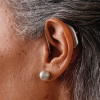Hearing well whilst on the phone is an issue that many people experiencing hearing loss face. However, your ability to communicate shouldn’t need to suffer as a result of your hearing problems. We understand that having difficulty communicating can be exhausting and frustrating, so have put together our top 5 tips for ensuring that you can hear better on the phone.
If you’re concerned about helping a loved one to hear better on the phone, keep reading until the end of the article where we include some advice on how you can improve your communication.
1. Find a quiet space
Background noise can interfere with your ability to hear in a variety of situations, including making phone calls. If you’re out and about when you receive a call, try to find a quiet spot, to help reduce any interfering background noise.
Alternatively, if you’re at home, move to an empty room away from other members of your household and turn off the TV or radio to help isolate the caller’s voice.
2. Communicate what works best for you
Hearing loss is nothing to be ashamed of. If you’re finding it tough to communicate with your loved ones on the phone, don’t be afraid to let them know how they can help. For example, you might prefer to speak in the morning when you have more energy and are feeling less tired.
We should also stress that there’s nothing wrong with asking the person you’re talking with to repeat themselves. We’re sure your friend or family member will happily speak up or more clearly if you need them to!
3. Use your landline phone
If you are at home, we would recommend asking family and friends to call you on your landline (if available). This is particularly helpful if you have a loudspeaker function, as it can help you to hear the call through both ears as opposed to just the one. Landlines sometimes tend to be a little louder than mobile phones as well.
If you are restricted to a mobile phone, you could try using a headset to help you hear through both ears and reduce any background noise. Alternatively, most of today’s hearing devices are Bluetooth enabled and can be connected to your mobile phone. Please get in touch if you’d like some help with this!
4. Consider technology options
Lots of newer hearing aids have the option to connect directly with your mobile phone through Bluetooth or a smartphone app. This can help you to hear the sound straight into your ear, whilst also blocking out background noise.
As well as this, you may wish to consider an amplified landline phone. These look like regular home phones but are designed specifically for those with hearing loss thanks to some additional features. These features include both a louder ringtone and the option to increase the volume of the person talking.
5. Try video calling
One of the key reasons why speaking on the phone can be so difficult is because you miss out on visual clues and lipreading that can assist you when talking face-to-face.
Applications like FaceTime, Zoom and Skype are great for reducing this problem. You will be able to speak to your friend or family member whilst seeing their face and picking up on the visual communication.
Quick tips for talking on the phone to someone with hearing loss:
- Speak directly into the mouthpiece but not too close!
- Speak at a natural speed and volume, don’t try to overemphasise words as this can often make it more difficult to understand
- Call from a quiet place with no or limited background noise where possible
- Try not to get frustrated if you need to repeat words or phrases








